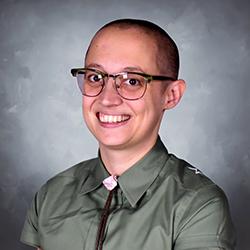In celebration of Open Education Week 2022, the Senate of College Councils and UT Libraries partnered to solicit nominations from students across campus to recognize instructors who increased access and equity by selecting free or low cost course materials for their classes. We’ll be recognizing a few of those nominees this week as Affordable Education Champions!
Affordable Education Champions are instructors who assign free or low cost resources – like textbooks, websites, films, and more – for their courses. Sometimes they author their own materials, and sometimes they’re able to reuse free or low cost work created by others. We share gratitude and appreciation for their commitment to fostering access to high quality education at the lowest possible cost barrier for their students.
Today, we congratulate and thank Dr. Nico Osier, who was nominated by their students in both N 223 (Genetics in Healthcare) in the School of Nursing and UGS 302 (The Art of Science Communication), a Signature Course in Undergraduate Studies.

Dr. Osier is an Assistant Professor, and they hold joint appointments in the School of Nursing (Division of Holistic Adult Health) and Dell Medical School (Department of Neurology). They have contributed to enhancing the curriculum at The University of Texas at Austin through creation of 2 novel signature courses and addition of an ethics flag to an existing course. They have mentored other faculty in teaching through their inclusion as a fellow in the Provost’s Teaching Fellows program and as an ambassador in the Experiential Learning Initiative. Dr. Osier is very passionate about teaching and mentoring the next generation of registered nurses and nurse scientists. They currently teach Genetics in Healthcare in the School of Nursing, and The Art of Science Communication for incoming students. Dr. Osier also runs The Osier Laboratory, where they have mentored over 200 motivated undergraduates, gap-year, and graduate students and provided them with meaningful research experiences, soft skill development, as well as opportunities to publish and present.. They really enjoy working with students outside of the classroom – both in the laboratory and on manuscripts, presentations, grants, and other professional development activities.
Dr. Osier’s choice to assign no-cost resources is inspired by their own experience as a first generation college student. Dr. Osier tells us, “I knew firsthand the impact free course materials could have on students in my class. I had a few teachers who were explicitly mindful of not making us spend money to be successful in the class and that was something I wanted to incorporate into my teaching strategy.”
Their students noticed this and agreed. “Buying or renting textbooks can be very expensive. Professor Osier ensuring that course materials were of no cost was amazing because it helped ease my financial burden of acquiring textbooks each semester,” said Njeri, a student who nominated Dr. Osier.
Beyond selecting materials that can be acquired at no cost, Dr. Osier also takes care to select and make available materials that are as inclusive as possible. One of their student nominators, Olivia, noted, “Dr. Nico Osier is flexible and continues to be one of the most memorable professors I have had. I took their class my freshman year and thought their impact on inclusive classroom materials taught me how important it is to have all kinds of… representation.” Another noted their efforts to make sure audio / visual course materials were appropriately captioned.
For Genetics in Healthcare, Dr. Osier assigns an open access text published by the American Nurses Association, Essentials of Genetic and Genomic Nursing: Competencies, Curricula Guidelines, and Outcome Indicators (2nd edition). The ANA makes this content available at no cost and with permissions granted to reproduce the work with attribution. For other instructors interested in adopting open and affordable course materials, they offer this advice: “There is so much reputable and engaging content out there that won’t cost your students a penny and won’t require you to reinvent the wheel. This is also a valuable opportunity to utilize multiple means of representation, by including reading as well as other multimedia sources (videos/movies, comic strips, podcasts, etc.). Not only does this maximize your ability to reach diverse learners, tying what they’re learning into popular culture engages students and highlights the relevance of the course content.”
Need help finding OER and other free or low cost course materials? Contact Ashley Morrison, Tocker Open Education Librarian (ashley.morrison@austin.utexas.edu).

